 2018 Mazda BT-50 Dual Cab II (facelift 2018) Dimensions, Size & Specs
2018 Mazda BT-50 Dual Cab II (facelift 2018) Dimensions, Size & Specs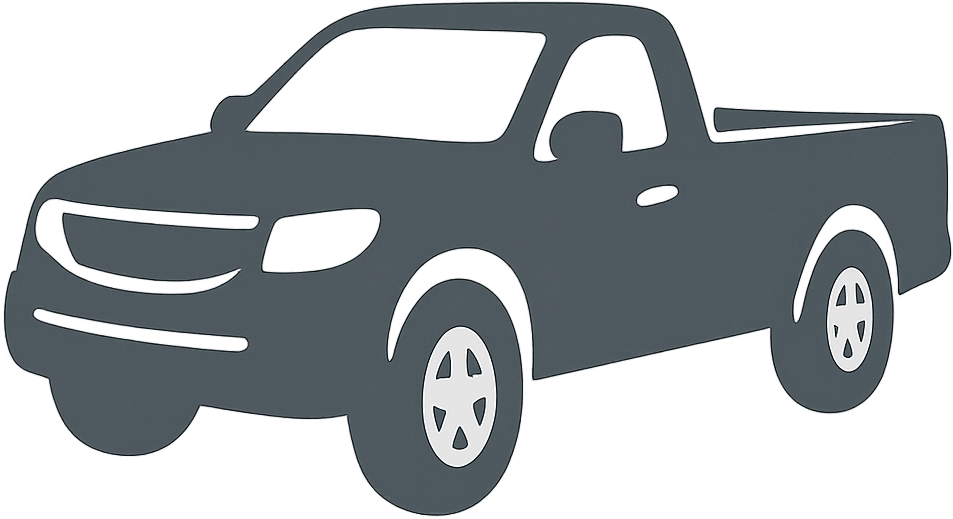
Measurements of the 2018 Mazda BT-50 Dual Cab II, engineered for optimal performance and comfort
| Dimensions | |
|---|---|
| Length: | 5365-5373 mm211.2-211.5 in17.6-17.6 ft |
| Width: | 1850 mm72.8 in6.1 ft |
| Height: | 1815-1821 mm71.5-71.7 in6.0-6.0 ft |
| Ground Clearance: | 200-205 mm7.9-8.1 in0.7-0.7 ft |
| Weight Specifications | |
| Curb Weight: | 1922-2105 kg4237-4641 lbs |
| Maximal permitted Weight: | 3200 kg7055 lbs |
| Tire Specifications | |
| Rims Sizes: | 17-inch rims:
|
| Tire Sizes: |
|
The Mazda BT-50 Dual Cab II facelift, produced from 2018 to 2020, is a robust mid-size pickup truck designed for both utility and comfort. This generation of the BT-50 offers a striking blend of rugged styling and practical dimensions, ideal for work and recreational use. Measuring between 5365 to 5373 mm (211.2 to 211.5 inches) in length, the BT-50 strikes a balance between a spacious cargo bed and manageable vehicle size. Its width stands firm at 1850 mm (72.8 inches), providing a stable posture on the road, while the height ranges from 1815 to 1821 mm (71.5 to 71.7 inches), giving it a commanding presence without overwhelming urban spaces.
The curb weight of the truck varies between 1922 and 2105 kg (4,238 to 4,641 lbs), which reflects its durable construction suited for demanding tasks. The BT-50 can handle a maximum weight of up to 3200 kg (7,055 lbs), further emphasizing its capability for heavy loads and towing. Ground clearance is another critical factor for pickup trucks and the BT-50 offers a generous 200 to 205 mm (7.9 to 8.1 inches), enabling confident off-road performance and improved maneuverability over rough terrain.
This generation comes with multiple rim options, including 8.0J x 17 and 7.0J x 16 sizes, fitted with correspondingly sized tires: 265/65 R17 112T and 255/70 R16 111T. These tires contribute to the vehicle’s traction and stability on various surfaces.
Overall, the Mazda BT-50 Dual Cab II facelift (2018-2020) is a versatile pickup truck featuring well-balanced dimensions and weight parameters that cater to both professional and lifestyle needs. Its combination of reliable engineering, off-road readiness, and practical size makes it a competitive choice in the mid-size pickup segment.
Discover the standout features that make the 2018 Mazda BT-50 Dual Cab II a leader in its class
Have a question? Please check our knowledgebase first.
The Mazda BT-50 Dual Cab II facelift, produced from 2018 to 2020, has an overall length ranging between 5365 mm to 5373 mm. In imperial units, this length converts to approximately 211.2 inches to 211.5 inches. This respectable length suits its classification as a midsize pickup, offering enough cargo space and cabin room while maintaining manageable dimensions for urban and off-road use.
The width of the Mazda BT-50 Dual Cab II facelift model is 1850 mm, which is about 72.8 inches. This width strikes a balance between interior comfort and road presence. It provides ample shoulder room for passengers inside the cabin while still allowing the vehicle to navigate typical city roads and off-road trails comfortably without being overly bulky.
The height of the Mazda BT-50 Dual Cab II facelift ranges from 1815 mm to 1821 mm (approximately 71.5 to 71.7 inches). This height ensures a commanding driving position with good visibility over traffic, which is a plus for both urban driving and off-road adventures. However, it also means the vehicle might require careful consideration when entering low-clearance garages or parking structures.
The curb weight of the Mazda BT-50 Dual Cab II facelift lies between 1922 kg and 2105 kg, equivalent to approximately 4239 to 4642 pounds. This weight range reflects the robust build quality typical for pickup trucks designed for both utility and comfort. The substantial mass contributes to stability and durability but may slightly reduce fuel efficiency compared to lighter vehicles. Nonetheless, it is well within the expected range for midsize pickups.
The Mazda BT-50 Dual Cab II facelift offers a ground clearance between 200 mm and 205 mm (about 7.9 to 8.1 inches). This high ground clearance is crucial for pickups to handle rough terrains, off-road conditions, and uneven surfaces without damaging the undercarriage. It also helps improve approach and departure angles, making the BT-50 suited for diverse driving environments.
This BT-50 generation is fitted with rims sized either 8.0J x 17 or 7.0J x 16, paired with tires sized 265/65 R17 112T or 255/70 R16 111T. Larger 17-inch wheels generally provide better handling and a smoother ride on paved roads, while the 16-inch variants offer a more comfortable ride and might be better suited for off-road durability. Tire sizes contribute to grip, load capacity, and overall ride quality, all essential for a pickup's versatility.
The typical width of a standard garage is about 2.4 to 2.7 meters (7.9 to 8.9 feet), and the height clearance approximately 2.1 to 2.4 meters (6.9 to 7.9 feet). Given the BT-50 facelift’s width of 1850 mm (72.8 inches or 1.85 meters) and height up to 1821 mm (71.7 inches or 1.82 meters), the vehicle comfortably fits within these dimensions. The length, at about 5.37 meters (211.5 inches or 17.7 feet), might demand deep garages but generally fits into standard single or double garages designed for pickups or large vehicles with ample space.
Compared to its predecessor, the BT-50 Dual Cab II facelift (2018-2020) maintains a similar footprint but introduces minor dimensional refinements. It primarily stays in the midsize pickup category, with slight increases or stable length (approximately 5365-5373 mm), width (1850 mm), and height (1815-1821 mm). These adjustments have been optimized for improved aerodynamics, interior space, and enhanced off-road capability, making it a practical evolution rather than a complete redesign.
When compared with contemporaries such as the Toyota Hilux, Ford Ranger, or Nissan Navara, the Mazda BT-50 Dual Cab II facelift offers competitive dimensions. Its length, ranging around 5.36 to 5.37 meters (211.2 to 211.5 inches), is comparable to these rivals, ensuring similar cargo bed length and passenger space. The width of 1850 mm (72.8 inches) aligns with industry standards, offering a balance between cabin comfort and urban drivability. Its ground clearance of approximately 200-205 mm (7.9-8.1 inches) also matches or slightly exceeds many competitors, enhancing its off-road capacities.
The Mazda BT-50 Dual Cab II facelift has a maximum gross vehicle weight of 3200 kg (about 7055 pounds). This figure represents the combined weight of the vehicle, passengers, cargo, and any trailers. It means the BT-50 can handle substantial payload and towing tasks, making it suitable for heavy-duty use whether in work or recreational contexts. For specific payload (cargo in the bed and cabin), subtracting the curb weight (ranging between 1922 kg and 2105 kg) from the gross vehicle weight gives an approximate payload capacity range of roughly 1095 kg to 1278 kg (2415 to 2815 pounds), ideal for a midsize pickup.
Discover similar sized cars.
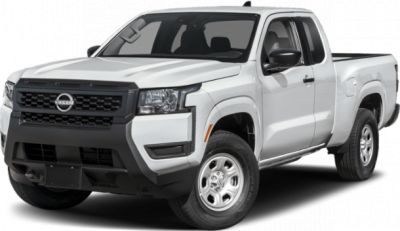
| Production: | 2024-present |
|---|---|
| Model Year: | 2025 |
| Length: | 5338 mm210.2 in |
| Width: | 2135 mm84.1 in |
| Height: | 1811-1824 mm71.3-71.8 in |
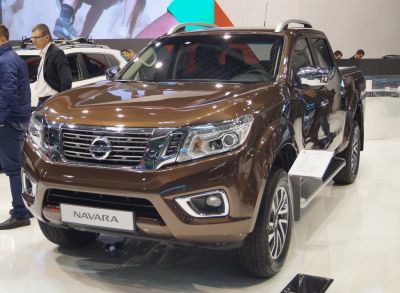
| Production: | 2015-2019 |
|---|---|
| Model Year: | 2015 |
| Length: | 5330 mm209.8 in |
| Width: | 2085 mm82.1 in |
| Height: | 1805 mm71.1 in |
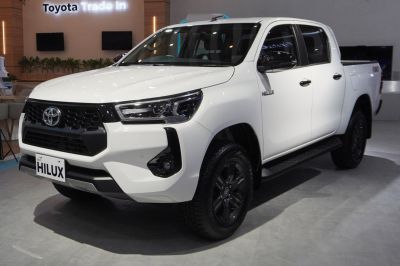
| Production: | 2024-2025 |
|---|---|
| Model Year: | 2024 |
| Length: | 5325 mm209.6 in |
| Width: | 1855 mm73.0 in |
| Height: | 1815 mm71.5 in |
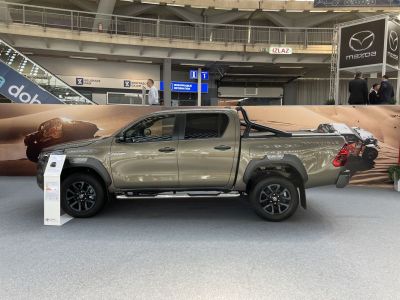
| Production: | 2020-2024 |
|---|---|
| Model Year: | 2020 |
| Length: | 5325 mm209.6 in |
| Width: | 1855 mm73.0 in |
| Height: | 1815 mm71.5 in |
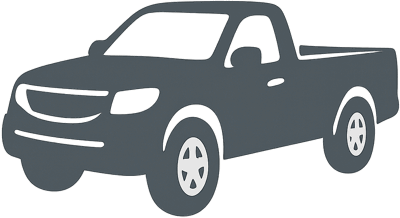
| Production: | 2020-2024 |
|---|---|
| Model Year: | 2020 |
| Length: | 5325 mm209.6 in |
| Width: | 1855 mm73.0 in |
| Height: | 1810 mm71.3 in |

| Production: | 2017-2020 |
|---|---|
| Model Year: | 2018 |
| Length: | 5330 mm209.8 in |
| Width: | 1855 mm73.0 in |
| Height: | 1810 mm71.3 in |
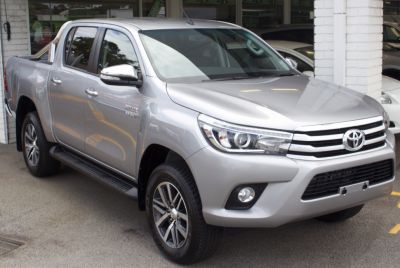
| Production: | 2015-2017 |
|---|---|
| Model Year: | 2016 |
| Length: | 5335 mm210.0 in |
| Width: | 1855 mm73.0 in |
| Height: | 1815 mm71.5 in |

| Production: | 2015-2017 |
|---|---|
| Model Year: | 2016 |
| Length: | 5335 mm210.0 in |
| Width: | 1855 mm73.0 in |
| Height: | 1810 mm71.3 in |
